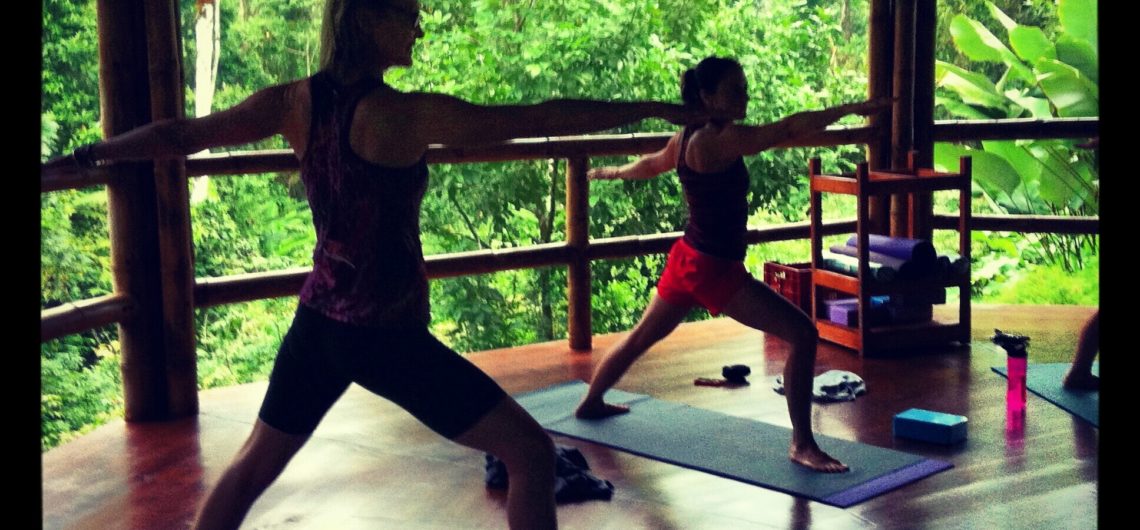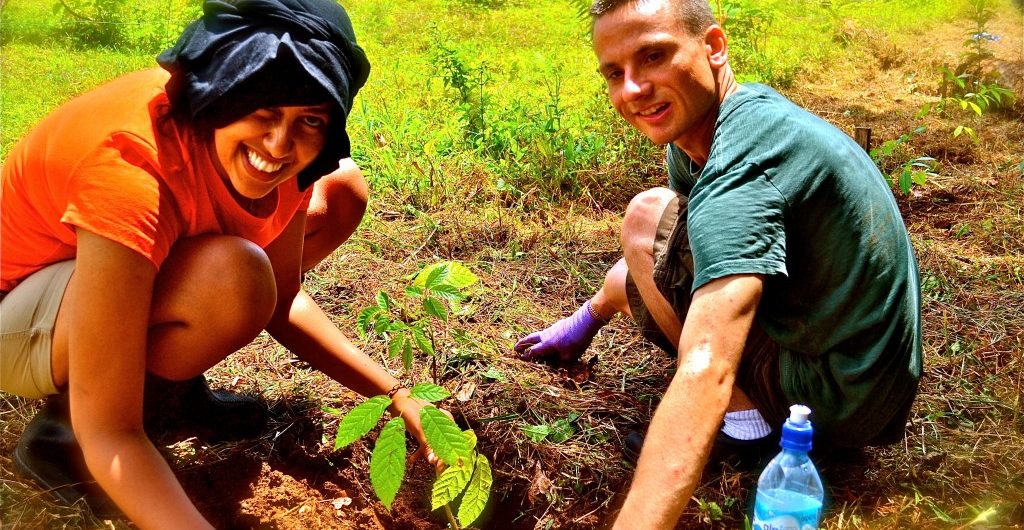 Just for now, without asking how, let yourself sink into stillness.
Just for now, without asking how, let yourself sink into stillness.
Just for now, lay down the
weight you so patiently
bear upon your shoulders.
Feel the earth receive
you, and the infinite
expanse of sky grow even
wider as your awareness
reaches up to meet it.
Just for now, allow a wave of breath to enliven your experience. Breathe out whatever blocks you from the truth. Just for now, be boundless, free, awakened energy tingling in your hands and feet. Drink in the possibility of being who and what you really are so fully alive that when you open your eyes the world looks different, newly born and vibrant, just for now.
I shared this poem by Dana Faulds in class in Costa Rica, reminding the group to allow themselves time to really be in the beautiful magic of Costa Rica and use it as a space and time to take care of themselves and to get back to who they are.

Over the course of the week, we softened our grip on our lives and responsibilities and let ourselves sink into stillness (or something similar). Staying at
Finca Luna Nueva Lodge, a biodynamic farm, allowed us to have a direct connection to nature. We ate food that was grown and compassionately raised by inspiring land stewards; we practiced yoga surrounded by the cacophony of of the rainforest; we observed nature in her own pace – the sun rising, the sloths traveling up and down trees, watching the weather shifting constantly.
We explored beyond Finca Luna and our comfortable limits: stand up paddle boarding on Lake Arenal, the world’s largest man-made lake, hiking the resilient ecosystem that surrounds Arenal Volcano, rappelling down waterfalls, rafting the rapids, and sinking into the healing warmth of the hot springs.

Between our multiple yoga practices each day and our explorations, we found time to practice sinking into stillness – massages, reading, walking & running on the property, and napping in hammocks.
Throughout all of this we discovered “moments” in which we had insights into who and what we really are. Some of these moments were in the quiet reverence of nature, and many were in the time we spent together at meals, on bus rides, on porches, and during our yoga practices.
These “moments” were revelations that we are boundless and free and that we have access to the energy within us.

These “moments” showed us that maybe we do give too much of ourselves and offer ourselves too little protection. Maybe we don’t make enough time to do the things that make us happy. Maybe we don’t step out of the cacophony of our wired trance to see, hear, and experience our lives as unique. Maybe we don’t recognize how much energy we have to spend on our own lives and how beautiful life is.
This energy and these insights are not to be squandered – they need to be nurtured and protected. Leaving Costa Rica, we understand that this is special and belongs to us. It should not be doused by jumping back into old patterns that block us from this knowledge.
So, pardon us if we seem a bit different as we return from Costa Rica. Excuse us if we become more deliberate like the sloths. And don’t mind us if we take more risks and have different perspectives on our day to day lives. We just got back from Costa Rica – newly born and vibrant, just for now.
We send out much gratitude to the staff of Finca Luna Nueva, True Nature Education, and the dozens of Ticos that made our trip to Costa Rica so wonderful. PURA VIDA!
 Just for now, without asking how, let yourself sink into stillness.
Just for now, without asking how, let yourself sink into stillness. Over the course of the week, we softened our grip on our lives and responsibilities and let ourselves sink into stillness (or something similar). Staying at Finca Luna Nueva Lodge, a biodynamic farm, allowed us to have a direct connection to nature. We ate food that was grown and compassionately raised by inspiring land stewards; we practiced yoga surrounded by the cacophony of of the rainforest; we observed nature in her own pace – the sun rising, the sloths traveling up and down trees, watching the weather shifting constantly.
Over the course of the week, we softened our grip on our lives and responsibilities and let ourselves sink into stillness (or something similar). Staying at Finca Luna Nueva Lodge, a biodynamic farm, allowed us to have a direct connection to nature. We ate food that was grown and compassionately raised by inspiring land stewards; we practiced yoga surrounded by the cacophony of of the rainforest; we observed nature in her own pace – the sun rising, the sloths traveling up and down trees, watching the weather shifting constantly. Between our multiple yoga practices each day and our explorations, we found time to practice sinking into stillness – massages, reading, walking & running on the property, and napping in hammocks.
Between our multiple yoga practices each day and our explorations, we found time to practice sinking into stillness – massages, reading, walking & running on the property, and napping in hammocks. These “moments” showed us that maybe we do give too much of ourselves and offer ourselves too little protection. Maybe we don’t make enough time to do the things that make us happy. Maybe we don’t step out of the cacophony of our wired trance to see, hear, and experience our lives as unique. Maybe we don’t recognize how much energy we have to spend on our own lives and how beautiful life is.
These “moments” showed us that maybe we do give too much of ourselves and offer ourselves too little protection. Maybe we don’t make enough time to do the things that make us happy. Maybe we don’t step out of the cacophony of our wired trance to see, hear, and experience our lives as unique. Maybe we don’t recognize how much energy we have to spend on our own lives and how beautiful life is.


 If you do not know any Spanish, we recommend learning the basic Costa Rican slang prior to your travel ventures. Even if you do know Spanish, it’s important to keep in mind that you may overhear words and sayings that are unfamiliar to Spanish language that you hear in other Spanish-speaking countries. Recall from our
If you do not know any Spanish, we recommend learning the basic Costa Rican slang prior to your travel ventures. Even if you do know Spanish, it’s important to keep in mind that you may overhear words and sayings that are unfamiliar to Spanish language that you hear in other Spanish-speaking countries. Recall from our 